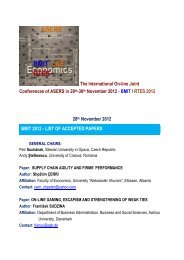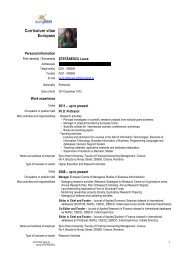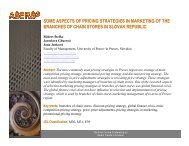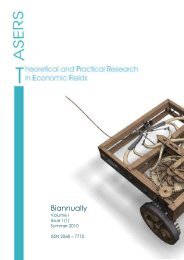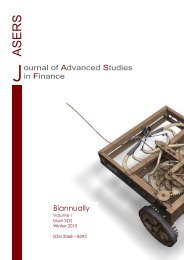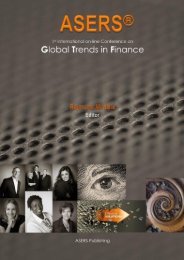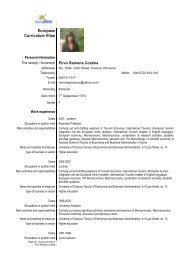eBook of Abstracts - ASERS
eBook of Abstracts - ASERS
eBook of Abstracts - ASERS
You also want an ePaper? Increase the reach of your titles
YUMPU automatically turns print PDFs into web optimized ePapers that Google loves.
The First Online International Conference<br />
29 May, 2010<br />
used to stabilize core inflation. This study will expectantly provide a benchmark DSGE model<br />
incorporating features <strong>of</strong> middle-income countries, and hence could serve as a starting point for<br />
monetary policy analysis for these nations. The results <strong>of</strong> the research reveal that contrary to<br />
common expectations, emerging market economies (EMEs) such as Egypt benefit from such credit<br />
policies even if their interest rates are not zero bound.<br />
Subsequently, the methods and costs <strong>of</strong> exiting from these unconventional monetary policy<br />
tools are estimated and the paper shows how these unconventional tools <strong>of</strong> monetary policy and the<br />
consequent financial regulation overhaul have resulted in the permanent reordering <strong>of</strong> the<br />
instruments, institutions and aims <strong>of</strong> economic policy. Finally, after the consequences and risks<br />
involved are evaluated, the research culminates in proposing a comprehensive roadmap comprising<br />
<strong>of</strong> financial overhaul as well as the deployment <strong>of</strong> a set <strong>of</strong> unconventional monetary policy measures<br />
especially with the recent orientation <strong>of</strong> monetary policy to the broader issues <strong>of</strong> financial stability,<br />
and not solely price stability. This blueprint is apt to prove helpful for other emerging economies <strong>of</strong><br />
similar circumstances to Egypt.<br />
Keywords: monetary policy, interest rate policy, monetary transmission mechanism,<br />
nonconventional monetary policy, balance sheet policy, public borrowing, exit<br />
strategies.<br />
JEL Classification: E40, E50, E52, E58, E60.<br />
Alterations in Monetary Transmission Mechanism in Egypt<br />
in the Wake <strong>of</strong> the Triple - F Crisis<br />
Monal Abdel-Bakii<br />
The American University in Cairo, Egypt<br />
monalbak@aucegypt.edu<br />
Abstract:<br />
At the turn <strong>of</strong> the century, the global economy was exposed to soaring food and fuel<br />
prices, in addition to the viscous blow <strong>of</strong> the global financial crisis. All three effects, concurrently<br />
dubbed the “Triple-F Crisis”, have altered the channels <strong>of</strong> monetary transmission mechanism<br />
(MTM) in most nations. Being the largest wheat importer in the world with a yearly import burden <strong>of</strong><br />
six million tonnes, the impact on the Egyptian economy was especially agonizing. This research<br />
explores the efficacy <strong>of</strong> the Egyptian monetary agent in cushioning the blow <strong>of</strong> this multi-facade<br />
crisis by focusing on the two most significant MTM channels for Egypt, namely the interest rate and<br />
exchange rate channels.<br />
The research instigates by investigating the effects <strong>of</strong> the crisis on the Egyptian economy<br />
and the attempts <strong>of</strong> the Central bank <strong>of</strong> Egypt (CBE) to quell the impact <strong>of</strong> the slowdown. A<br />
Structural Vector Autoregressive (SVAR) model estimates the extent <strong>of</strong> internal and external<br />
shocks. The main contribution <strong>of</strong> the paper is the introduction <strong>of</strong> the expectations channel based on<br />
a field survey administered for a period <strong>of</strong> 21 months. This inclusion is essential especially in view<br />
<strong>of</strong> the pessimism about future inflation and the impending gradual removal <strong>of</strong> petroleum subsidies<br />
by the Egyptian government.<br />
The results <strong>of</strong> the study suggest that the CBE has to use a combination <strong>of</strong> tools to restrain<br />
inflation while simultaneously boosting output. This can be achieved through expanding the<br />
monetary base using open market operations (OMO) and maintaining an appreciated domestic<br />
currency. Since cutting interest rates will have mild effects on output and a lagged and moderate<br />
3



